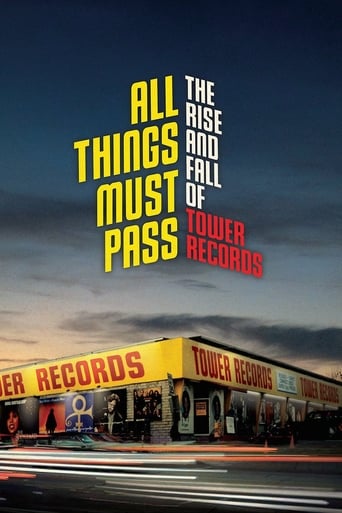

Growing up in the sixties and seventies for me, as with most young people then, records were a part of our daily life. Possibly more so than ever before music shaped us and molded us. It was a part of our daily lives as transistor radios made it easy for us to have access to music. That paved the path for us to seek out the music we loved and in so doing directed us to the record store, that glorious haven of vinyl that drained us of money earned mowing lawns.While record stores were mostly mom and pop joints at the same time chains began to pop up. Locally there was Karma Records and Peaches. But perhaps the most famous well known record store was Tower Records. Tower Records was the store in LA that was featured in numerous movies I saw in the 70s. The building with the huge replicas of album covers posted on the outside of the building, where rock stars showed for release parties and where they could also be found picking up the latest hits was well known no matter where you lived.When I saw this documentary was coming out I was excited to hear about their story. Vinyl had disappeared from the music scene by compact discs but that didn't destroy the music store business. Then along came digital downloads. No longer did you have to go to the store to purchase your music. You could just get online and there it was. That brought about, to me at least, the end of the music store business. But watching this documentary I learned that wasn't exactly the case with Tower Records.The movie starts at the beginning of the business, how it was small like all businesses are and then grew over time. It shows the gradual progression of the small business into the conglomerate that it was, an influence in the world of music it was so big. There was a time when Tower Records boasted that it made $1 billion dollars in a single year. But then things begin to change and the fortunes once thought to be never ending slowly changed.This movie is incredibly well made. Some documentaries have that boring tone to them, a slow meandering pace that makes you anxious for it to get to the point. This film draws you in from the start with smooth storytelling and great visuals that take you back to the time when record stores ruled the world of music.While watching the movie I found myself recalling all those hours spent in record stores looking at album art, many of those albums which I have retained for that very reason. I thought of looking at the new releases up front and the cut out albums I could purchase for less if funds were tight. I realized how many songs bring back certain memories to this day. I can't hear "Band on the Run" without thinking back to walking in a parking lot as I left a free outdoor concert and it blared from the sound system between acts. All of these thing tie in to visits to the record store.And this movie brought back memories of that desire to see the mecca of all record stores, Tower Records. It was there in Rolling Stone magazine. It was featured in movies like FM. It was always there and now like many things from the past it is gone. Talk to young people today and they have no idea what Tower Records was and less about what a record store is.The movie is well crafted and holds your interest from start to final credits. It includes some memorable music as well as commentary from various music royalty. It tells the story not only of the store but the history of records and the music business as well. Best of all it never gets boring. So watch this with someone young so they can see what it was all about. Show them what going to the record store was like. And relive some of those great memories you still have. Dream of what it would have been like to visit that best of all record stores, Tower Records while watching.
... View MoreHere's an essentially fraudulent history of Tower Records, one of the most successful music businesses in history — until it wasn't. We get the usual endless interviews with employees, plus a few now-doddering celebrities babbling on about the wonderful times they all had. The employees from management on down were apparently loaded on booze and who knows what else day in and day out. What a party they all had! (Somehow, this doesn't jibe with my own recollections of Tower, where sullen clerks with nails pounded into their faces couldn't find their own behinds with both hands, but maybe that's just grumpy old me.) Anyway, the fascinating (not) interviews about the glory days take up most of this pseudo-documentary. Then comes the big reveal. What killed Tower's business was — wait for it — digitized music and its subsequent piracy. Gosh, I never would have guessed. And when you stop to think about it for a minute, there's a big lie at the heart of this revelation. What killed Tower Records and the CD business in general was their own greed. To get the one decent song you wanted, you had to shell out 20 smackers for a CD filled with more bloat tracks than Samsung packs crappy apps into their phones. It was a colossal rip-off. So when Steve Jobs came along with iTunes and let you go back to the grand old days of the 45 rpm single, and you could buy the one track you wanted for 99¢, it was time for all the record store pirates to say goodnight. In any case, I fell asleep four times trying to watch this train wreck to the end, so for its narcotizing properties, I am awarding this turkey two stars instead of one star.
... View More1. Entertaining, as it seems we do everything either for our entertainment or we do something to get something we can trade for entertainment, Like money or free time. 2. Informative, so we can come away thinking about something. 3. Well crafted, so the flow is not broken by subtext's material that may apply to a character, but not relevant to the subject.This documentary is very entertaining, and is a wonderful window into history, albeit a small one. It is human, and very honest. During the time of Tower, the world had space for crazy, human, amazing stuff. The documentary illustrates this very well. Right time, right place, right guy, right idea. It was about freedom then, doing your own thing, being and loving what you do, and the film displays this very well. RUSS SOLOMAN VS. STEVE JOBS...now there is food for thought, although the food might come in a paper sack. We want entertainment, and we are getting it in spades. Was tower depicted as a phenomenon of the times it flourished? Sure, and what evolved from that, and all those young people who had the power of Tower? Whoops.
... View MoreThey call it luck, but it takes a particular type of wisdom to be at the right place at the right time. Russ Solomon had this in spades, when he branched out from his entrepreneurial father to expand into records. This movie is a blueprint of how to start a great business. First of all, have the vision. Secondly, get great people, give them freedom and back them up. Sounds simple, but very few businesses actually do this. In the movie, various key employees are interviewed and they all basically tell the same story. That is that they were given a chance to prove themselves and they rose to the challenge. Russ also realized that he could tap into the collective wisdom of all his employees and this he also did, especially with advertising and the Tower Records publication Pulse! It is refreshing to see the 60s again, the hope and the freedom. Russ also realized that he was not a financial type, so he hired an excellent money manager in Bud Martin. The demise of tower records was quite sad, but technology replaces one thing with another, so it was a tremendous ride.
... View More